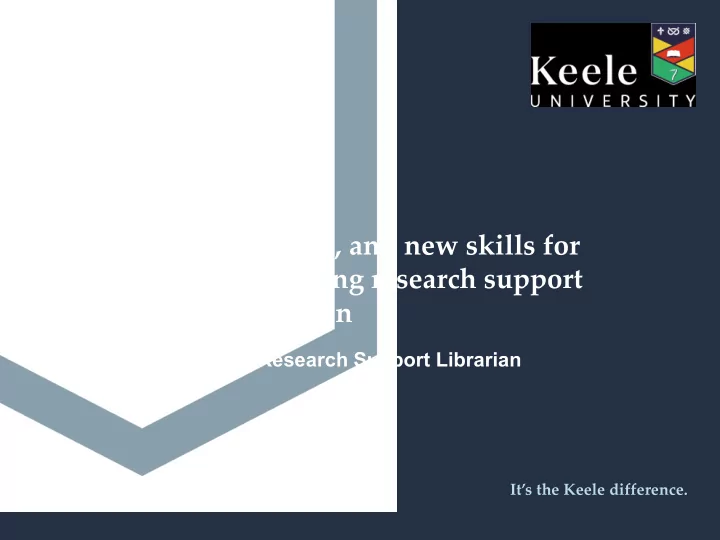

Open Access, RDM, and new skills for Librarians: delivering research support in a small institution Scott McGowan – Research Support Librarian It’s the Keele difference.
Research Support at Keele Library • Work within Academic Services Team – report to team leader who oversees broad range of Library services • At Keele since 2007 – Digitisation services initially, then School Liaison Librarian until 2014 • Research Support Librarian since 2014, plus Scott Chesworth, Liaison Librarian Science Faculty, 0.33 • Research and Innovation Support team – Hannah Reidy, Research Support Assistant – oversees CRIS system • Senior Assistant Librarians – contribute some hours each week for repository work It’s the Keele difference.
Who are the Researchers? • Get to know researchers in my own institution • Open access – dealing with a range of policies • Link with Research Support staff – ask questions about things you don’t know about • Researcher training and development team – ‘Academic Development’ • Discussed and explored themes for researcher training with academic developers It’s the Keele difference.
Open Access – First Steps • What is it? Read the Peter Suber “Open Access” book! (MIT Press) • Open Access policy documents (UKRI, RCUK, Funders) • Repository system training – I learned enough to get started – systems were all there beforehand • Community resources e.g. SHERPA-Romeo/Juliet • United Kingdom Council of Research Repositories (UK- CORR) – joined, JISC newsgroup very useful • Event networking – get perspective of others e.g. JISC events, Mercian Group, RDM • Twitter – lot of OA discussion here – learned a lot by following people, groups, organisations It’s the Keele difference.
Researcher Development • Created links with Academic Development team • Learned about the VITAE Researcher Development Framework (www.vitae.ac.uk) • Identified relevant researcher development themes • With Scott Chesworth, devised sessions, themes and learning outcomes • Programme of development sessions • Now embedded in new researcher training programme – providing • Summer schools It’s the Keele difference.
Researcher Training Session Themes • Some familiar ones but also some new • Literature searching • Current awareness services • Open access • Research dissemination, scholarly communication tools, social media strategies, ORCiD etc. • Impact factors – using the Web of Science • RDM – new theme for this year It’s the Keele difference.
Research Data Management (RDM) • Invited to join RDM Working Group, then tasked with working on new repository • Still learning about this area • With colleagues in research support and IT, set up new data repository (Eprints hosted system) • Joined Mercian RDM Support Group • Digital Curation Centre – (www.dcc.ac.uk) valuable introductory resource • Wrote RDM policy with help of Keele’s Research Governance Manager • Advising on RDM for grant applications It’s the Keele difference.
Self-Development • Lot of academic works on research support, repositories, metadata, OA out there • Development opportunities at your university? • Improving teaching practice through staff development opportunities • Sought help from fellow Librarians – get a handle on resources outside my subject area (e.g. medical) • Enhanced my practices around devising and delivering training • There’s real scope to develop the post yourself • Be guided by the key local objectives and determine what is achievable, take small steps It’s the Keele difference.
Make Connections • Accepted invitations to join research-related committees • Cultivate contacts – if time permits go along to local events (impact showcases etc.) and useful sounding ones outside the institution • Use scheduled events to signpost other training and/or support available • Bespoke marketing (website, leaflets) for researcher development activities • Twitter is an active OA forum It’s the Keele difference.
Challenges • Some previous internal disagreements on repository, technical support not readily offered etc. • Researcher engagement with/understanding of OA • Establishing the role within the Library team • Librarian role – getting involved beyond publications/RDM? • Learning the research publication environment • Technology • Organisational changes and re-structures • Time pressures – small team, other responsibilities • Learning and self-development • Managing expectations – agreeing objectives It’s the Keele difference.
Open Access Challenges • Managing the policy takes a lot of staff time • Depositing – right versions, capturing and/or correcting metadata • Checking recent or pending publications – chasing researchers for accepted manuscripts • Symplectic Elements CRIS is okay at identifying publications but we have to chase • Checking publisher alerts or Web of Science • Often have to go back and manually update records • Systems aren’t mature – JISC Publications Router a potential benefit It’s the Keele difference.
Technical Challenges • Diversity of systems (CRIS, repository) • User’s interaction with systems – training offered but they try and get you to do it for them • Appropriate safeguards built in? GDPR, policies around open data? • Liaising with hosted services and IT • They promise a lot, and they charge a lot too • APIs – need to upgrade our knowledge or try to work with people with “developer” knowledge It’s the Keele difference.
Successes • Steady rate of repository deposit – REF compliance above 80% • Good attendance and positive feedback from researcher development sessions • Strong links with researcher development team - training now embedded in scheduled development timetable and in PG programmes • Data repository development – senior management are supportive • Early RDM adopters through existing work on open access It’s the Keele difference.
Repository Deposits It’s the Keele difference.
Repository Downloads It’s the Keele difference.
Future Aims • Launching data repository – evidence of further engagement with open research? • Budget for CRIS/Repository system enhancements – making case • Better marketing of our offering to researchers? • REF compliance and the future shape of REF policy (UKRI review, Scholarly Communications Licence?) – working with REF colleagues • Audit our skills for future development • Re-evaluate our service offering, assess feedback • Engaging further with open research – going beyond REF compliance It’s the Keele difference.
Recommend
More recommend